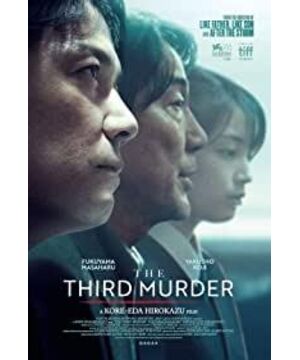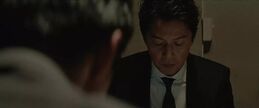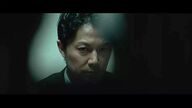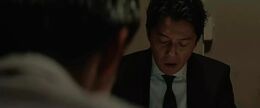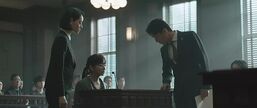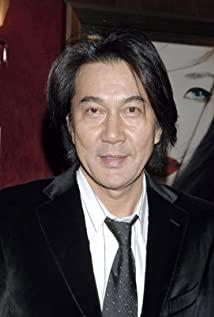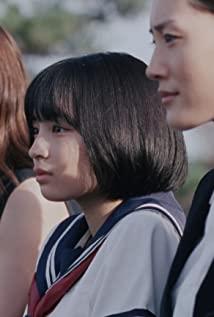A considerable number of people think that the film "Murder of the Third Eye" is a transformation of director Hirokazu Kore-eda, and it is positioned as a suspense film. I do not agree with this.
It is true that, as a suspense film, its plot is not complicated enough, and the content lacks the compactness and excitement of interlocking, as if it is just an indifferent traveler, walking in a circle in the mist, and walking at a slow pace. back to reality. But I really don't understand, what's the point of people's insistence on giving each movie a clear position? Is suspense really the theme of this movie? Is it the director Hirokazu Kore-eda who is willing to speak for the superficial?
Rather than saying that the director is transforming into a crime suspense film, it is better to say that his focus of shooting has shifted from a small family to the whole society, just like the macro and panorama of the camera. This time, he is directly talking to the imperfect side of society.
It's Hirokazu Koreeda who always has something to talk about, so even though I've written film reviews for many of Mr.'s works, I still never tire of it. So, let's take a look at what he has new for us!
001 The estrangement between father and daughter
While family ethics is no longer the focus of the film, it still forms the theme. It is worth noting that the director, who has portrayed the conflicting emotions between father and son many times in the past, finally focused on the estrangement between father and daughter.
The film records three pairs of father and daughter, each of which presents a certain pathological condition. Misumi Takaji's daughter wanted him to die because he couldn't bear the social discrimination brought by the criminal father, but Misumi Takaji still had deep affection for his daughter; Yamanaka Sakie hated his father deeply because he had been sexually assaulted by his father for a long time and was ashamed of food fraud, and he died. The father is missing in the film; Shigemori feels ashamed but unable to do anything about his daughter's dismay at his father's busy work and neglect of the family. There are similarities between these three relationships, and it is these similarities that constitute a sub-line of the film, making Saki - the girl who hates her father, Misumi - the person hated by her daughter, Shigemori - the father Lawyers who are estranged from women are somehow connected.
I don't want to talk too much about the father-daughter complex here. Many people become fathers at an age that is not suitable for fathers. People talk about fatherhood as nature, always with a certain narcissism and self-movement. There are still many irresponsible fathers in the world. They are either like this by nature, or they are helpless, which has already proved that fatherly love as a kind of nature is not worthy of the name. In fact, for the latter, it was Hirokazu Kore-eda who put himself in his shoes, Shigesheng's helplessness and shame, and even his reflection, all had the shadow of his husband to some extent.
002 Born to be human
"There are people in the world who are better off not being born."
This is Sanyu's thought expression during his only mental breakdown, desperate, desperate and angry, as if asking: "Why? Why am I born human?" He denied his own, so he was still halfway there, "I Not worthy!"
I think of a Japanese movie I watched a long time ago - "The Life of the Disgusted Matsuko", very cruel, that was the first time I realized that "you will get it elsewhere" for the unfortunate It is the most useless promise, and it is also the first time I have decided to surrender to fate. You will see how vulnerable the so-called "man is sure to conquer the sky" is in the face of the ruthless manipulation of fate. A person who has climbed out of the abyss countless times, a person who struggles to do his best for life, is still slumped and ended. Because he felt unworthy to be born, when he left the world, Matsuko said, "I'm sorry to be born as a human being."
Is it really better if someone is not born? some. The right to answer this question rests with the parties themselves, and only themselves. Is it worth the trip? We need to spend our whole lives in exchange for answers. Special circumstances, such as those who choose to commit suicide, are only answered in advance. When a person still feels that his life was in vain at the end of his life, and when he looks back on the past, only suffering and misfortune are haunting his mind and cannot be relieved, he can think that it would be better for me not to be born.
Are there really people who don't deserve to be human? No. Just as there is no absolute good, there is no absolute evil. He has been a relief to even the most vicious people. People are always adding and subtracting merits and demerits, as if the moral system and value system of society have been perfected to the point where individual contributions can be calculated with formulas. However, I can’t help but ask, even if someone’s merits are not worth it in a lifetime, can the value created by them be easily erased? And who can know the details of this man's life to the point where he is qualified to judge whether he is a man?
"It has nothing to do with human will, life is chosen."
The same sentence appears twice in the film. It is the spiritual resonance of lawyers and criminals, and it is also the director's sympathy. The injustice of fate is an irrefutable fact, so life is sometimes an absurd farce. Heroes lose their lives and suffer infamy, and villains end their lives happily. As Wilde depicted in The Faithful Friend, the good Hans dies and the mean farmer enjoys a happy ending. Destiny has nothing to do with personal will, it comes from the judgment of God, there is no morality or justice, and it does not need to be answered by human beings.
Above, in fact, I personally think that a better expression should be "unfortunate has nothing to do with people's will". Because misfortune has always been a disaster, and people are powerless to change it; but luck can be actively created. It's like "opportunities are always reserved for those who are prepared." In fact, it means that opportunities come to many people, but only those who are prepared can catch them, so it is called good luck. It has nothing to do with human will, but more refers to the determining role of fate on the individual. However, this is something that can only be judged after a lifetime. We still have to rely on our personal will to fight, until the last moment, to finally discern whether we are favored or not.
003 empty container
The prosecutor from thirty years ago recalled Misumi Takashi, likening him to an empty container. Shigesheng tries hard to prove that he is not, but Misumi's final performance throws him into confusion. I can't understand the deep meaning of the director, what exactly does the container refer to, and what does it prosper?
This is not the first time I have come across people as containers, which Mr. Mu Xin has mentioned in his articles in the past. However, he believes that people are more like conduits, through which sorrows and joys are intertwined, and not a drop remains; rather than a container, which can only be filled and has nowhere to tilt. Here, Mr. Mu Xin's container is filled with emotions.
If the director's container is also used to hold emotions, then Takaji Misumi is obviously not an empty container, he just tries to make himself look as empty as possible. However, he was happy, and smiled contentedly after swallowing a piece of bread ground with peanut butter; he was angry, angry that fate treated others unfairly, and angry that he was incompetent but survived; Thanks; he has hatred, because he hated the coldness of the boss's wife and ruined her reputation... Such a person with both joys and sorrows, even as a container, is by no means empty.
But if the director's container contains social and moral cognition, Sanyu is very likely to be an empty container. He didn't think it was wrong for him to kill people because they deserved to die. So even in prison, he lived peacefully without any guilt, and we could even see an almost detached piety in him.
This kind of piety reminds me of the man in the movie "Perfume" who killed several girls in order to make the most perfect perfume in the world. When he finally conquered the world with the perfume he made, he looked the same, pious and Peaceful. Unlike most murderers, they don't have any moral struggles in killing people. Instead, they commit suicide by adhering to their own moral judgment, which is completely separate from the cognitive system of society. Therefore, in terms of the sense of guilt that the prosecutor wanted to see in him thirty years ago, Misumi is empty; in terms of the sense of justice of the social attributes that Shigesheng wants to seek in him, Misumi is also empty.
Takaji Misumi under the camera is more like a paradox with extreme thoughts. He has two attributes, devil and angel. Which one he becomes is different from person to person. He committed murder twice, but the landlady insisted that he was a good person who did things well; his hands were covered in blood, but his attitude was always modest and polite; when he was out of control, he was like a brutal beast, but he was peaceful and detached in normal state; he strangled five The canary, released one, and fed the birds by the window of the prison... Good from love, hatred from hatred. Perhaps it is precisely because of this clear distinction of love and hate that I can't find anything hateful in Sanyu, but I feel that he has a pure and flawless soul like a child.
He is indeed an oddball to the world, unequivocally loving and unequivocally hating.
004 Where is the truth
Thirty years ago, the motive of Sanyu Gaosi's murder was unresolved because no one cared. Now, the fog has resurfaced, and the lonely ferry of Sanyu is finally no longer ignored.
Frequently changing his mouth, weaving lies, and finally rewriting his confession, Misumi Takasi stubbornly wiped out the truth from the world. He is contemptuous, looking at the judges and prosecutors indifferently, like a group of clowns. Because he understands the hypocrisy of the judiciary too well, understands the indifferent attitude of the world to the truth, and understands that those who punish will never have true empathy, so they simply let the truth become a puzzle until they meet someone who is qualified to play.
Shigesheng is the guy who got the qualification to play the game. Misumi saw in Shigesheng an unabated empathy, and a certain mysterious connection, so he was honest with Shigesheng, allowing him to approach the truth infinitely. Even if Shigemori is the one who finally uncovers the truth, Misumi is willing.
Shigemori's gradually awakened attitude of seeking the truth is the main thread of the film, and the director is trying to insinuate the shortcomings of Japan's social justice system. Defense lawyers only want to achieve the purpose of commutation, and they can do whatever they can to do so; prosecutors only care about their own appearance, and have preconceived discriminatory attitudes toward criminals; judges can easily make final decisions in order to save processes and costs... This is responsible for justice A group of people who "perform their duties" and "do their duty with due diligence". Losing a cautious and cautious attitude, they can judge a person's life and death without asking the truth, and can guide prisoners to admit unwarranted crimes. Such a perfunctory thing, for a society that relies on justice to maintain justice, how sad !
Young defense lawyers want to know the truth and understand the prisoners, but senior lawyers sneered at this, emphasizing the meaninglessness of such behavior; junior prosecutors wanted to follow the procedure to give the prisoners a chance to prove their innocence, but they stopped at the superior's. a look. In this way, one generation destroys the enthusiasm of one generation, the truth is abandoned, and what is created is a rigid and temperatureless judicial system. They deprived the judged of their right to speak for themselves, and they were ashamed of the people's trust and the respect of the society.
However, what is even more absurd is the mental deformity of the whole society. "Are you interested in the truth?" Sanyu asked Shigesheng like this, and he was also asking you and me in front of the screen. I wonder, are those people who mocked this movie not qualified to be a suspense movie, are they really interested in the truth? This is the era of the blind and the dumb. It was Hirokazu Kore-eda who saw it, saw that we were blind to the truth with empty eyes, and that we knew injustice but chose to remain silent for fear of prostitution. The truth has become dispensable, and the truth does not know where to go! Yes, truth is never necessary to survive, so even if we skip it, we still laugh.
However, life will not allow the truth to be absent for long. Avoiding the truth is just the most useless shut-eye. There is no utopia in the world. People stubbornly choose to be stubborn, which is why there are mothers who condone their husbands to molest their daughters for many years, and food fraud factories have stood for years without falling. However, even if we avoid it, we ignore it, we cannot escape the fate of encountering it head-on. When one day judgment comes, people realize the cost of turning a blind eye.
Saki said, "Because I didn't want to pretend like my mother didn't see anything," she chose to apologize for Misumi by confessing her wounds. This is the courage of a child, how many cowards who look bright but are actually ugly? We should ask ourselves: Are we ashamed of our conscience when we avoid the truth and watch from the sidelines?
005 Judgment and Redemption
People say it's a movie without an ending, and I think there is. Misumi did choose to temporarily revoke the confession in order to protect Saki, and denying this was the most resolute part of protection. He once hinted at Shigesheng that he deliberately let go of a canary, and at that time he made the gesture of releasing it; when he finally got the death sentence, he passed by Sakie and repeated the gesture of releasing it. Choosing to face the death penalty is Misumi's release of Sakie, and it is also a sad and absolute redemption.
In fact, Shigemori is already close to the truth. If it wasn't for the fact that the girl asked to reveal the scar of her father's sexual assault in court, in an attempt to save Misumi in a way that was close to self-destruction, Misumi would probably present the truth to Shigemori more clearly! In fact, Misumi has never been obsessed with covering up the truth. What he hates is the attitude of people's indifference to the truth.
As for what Shigesheng was puzzled by, whether the fundamental motive of this unsolved case was sanctions or rescue, the director did not give an answer. However, presumably every audience will have their own answers in their hearts.
If I have to find a starting point for Misumi's crimes, I think it is love. He has a perverted desire to punish life, but he has never slaughtered the countless evils in this world. Please note that this is not a random crime, Misumi Takaji transferred his love and guilt for his daughter to Sakie. Of course, he hated a boss who molested his daughter and faked food, but if Saki didn't want his father to die, Misumi would definitely not kill him. Therefore, I believe that even though there is an element of judgment in the motive of murder, it is more for redemption.
Sanction and salvation are never either one or the other. The punishment for the perpetrator is the redemption for the victim, so Misumi punished Sakie's father and sentenced him to death without a corpse in the name of God, so that the girl was freed from the bondage of hell. As the film draws to a close, I feel more and more that it is pointless to investigate Misumi's motive for murder. In any case, he completed the redemption of Saki by sacrificing his life, and even, unexpectedly, saved Shigemori who had been anesthetized for many years.
At this point, I want to say: "Mr. Miyu, you are born as a human being, forgive yourself, you are fine."
View more about The Third Murder reviews


